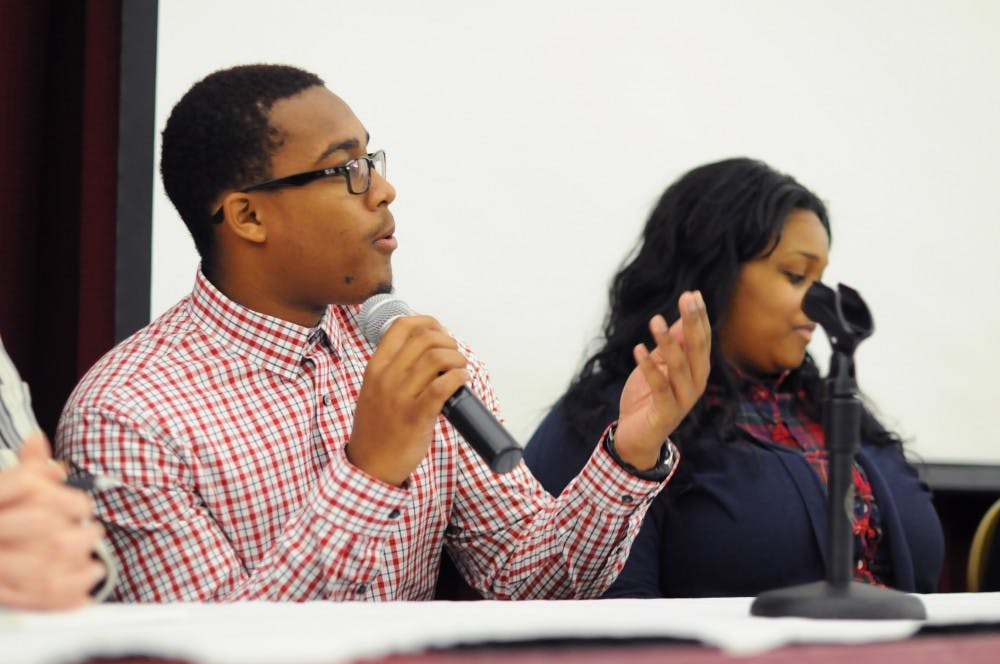Feurgson to Mount Pleasant speaks of race relations and police

After the shooting of Michael Brown in Ferguson, Mo., Central Michigan University Police Chief Bill Yeagley said it caused him to revisit the sensitivities within our own community.
"At universities, we have a lot of people who are not from Mount Pleasant, and that gives them a lot of life experiences that we don't have," Yeagley said. "We as police officers don't think about it that way all the time."
Nearly 140 students, faculty and community members came to the Bovee University Center Rotunda on Tuesday to discuss the difficult subjects of race and the role of the police.
Soup and Substance, a luncheon program that showcases research on diversity and on traditionally under-represented groups by members of the Central Michigan University community, partnered with Speak Up, Speak Out to hold "Ferguson to Mount Pleasant."
Tuesday's lunch was a discussion on how the shooting of Michael Brown relates to the community and culture on campus.
Justin Smith, faculty in the sociology department, hosted the event. Panelists included students Jacquelyn Taylor, Tre Mason and Derek Thornton.
Mount Pleasant Police Officer Jeff Browne and Central Michigan Police Chief William Yeagley along with Professor Liz Bradshaw and Stan Shingles, assistant vice president of University Recreation, were also on the panel.
To illustrate their frustrations with race relations in the wake of Ferguson, the student panelists gave some of their personal stories of their encounters with the police.
Taylor, a Detroit sophomore, shared her father was once pulled over and during the stop went to check his blood pressure because he was a diabetic. The officer thought her father had a gun. He then tried to explain what he was doing, yet, the officer shoved him against his car and then put him in the police car.
"It really shocked me that things like that are still going on," Taylor said. "I tell my black friends who are males to be careful on how they react to situations in public."
Mason, a Saginaw junior, said she has seen many cases where minorities were being stereotyped by police officers. She did acknowledge, though, that police officers have a difficult job.
"I have seen the small stuff add up to big stuff, but I can see it from the law enforcement perspective," Mason said. "Law enforcement is here to do their job, and I think a lot times we have to take that into account,"
For many at the event with Bradshaw included, the Michael Brown incident is not isolated incident, and that race relations are still a major area of improvement for America.
"While we may not have the same race relation problems here in Mount Pleasant, across Michigan in a lot of the big cities, we do have a lot of racial segregation," Bradshaw said. "When student leaves those environments and come up here, it might change how the view and react to police officers."
Shingles, who has openly taken a strong stance against police brutality and segregation, described an incident in 2004 where he was chaperoning a fraternity dance, and the police were called because a fight broke out.
"I grew up in the inner-city of Chicago, and I have seen a lot of terrible things in my life, but I never thought I would see a police officer towards a student activities center cocking a shotgun," Shingles said. "This happened right here, so we too are Ferguson, Mo."
To counter potential problems of police aggression in Mount Pleasant, Browne said his department is discussing getting cameras and microphones to protect both police and citizens.
However, Tamika Williams, grad student from Detroit, said that she thinks that although the event was good and much needed, she thought it should have focused more on the events that occurred in Ferguson.
"They are two different places, and I felt that some people got sensitive about their jobs and perspectives," Williams said. "Police have a hard job, but you have a different perspective seeing it from the outside, and it's something they should keep in account. Overall, it was a good event, and I think it gave everyone who came some great insight."
The next Speak Up, Speak Out discussion will be about elections and will be held at 7 p.m. on Tuesday, Oct. 21 in the Charles V. Park Library Auditorium.
For more information on Speak Up, Speak Out, visit chsbs.cmich.edu/suso.



